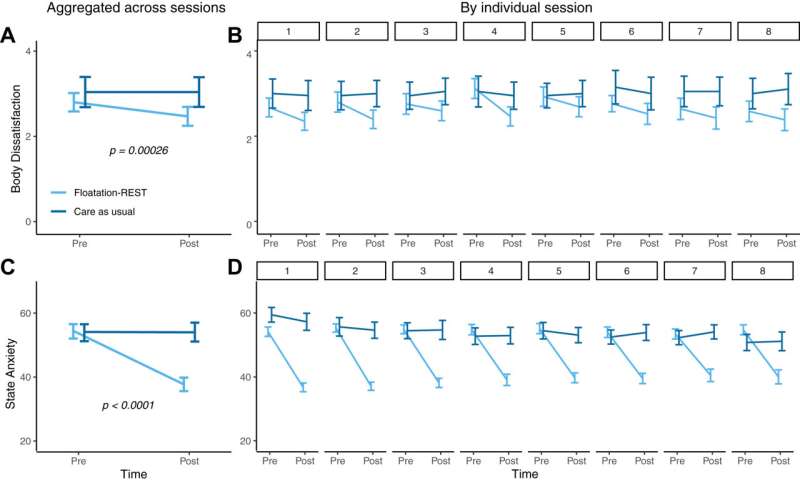This article has been reviewed according to Science X's editorial process and policies. Editors have highlighted the following attributes while ensuring the content's credibility:
fact-checked
peer-reviewed publication
proofread
'Float therapy' for anorexia nervosa shows promise

A trailblazing study conducted by researchers at the Laureate Institute for Brain Research (LIBR) in Tulsa, Okla., has made significant strides with a novel technique for treating anorexia nervosa (AN), an eating disorder characterized by low body weight, body image abnormalities, and anxiety. The study, "The impact of floatation therapy on body image and anxiety in anorexia nervosa: a randomized clinical efficacy trial," appears in eClinicalMedicine.
The researchers identified several immediate and sustained effects of floatation-REST (Reduced Environmental Stimulation Therapy) in inpatients with anorexia nervosa. Also known as "float therapy," floatation-REST is a non-pharmacological treatment that involves floating effortlessly in a shallow pool of warm water saturated with Epsom salt, in a lightproof, soundproof, humidity- and temperature-controlled environment, and it is increasingly used by the general public as a stress reduction tool.
In the study, the anorexia nervosa inpatients randomized to receive floatation-REST reported immediate and repeated reductions in body image dissatisfaction and improved anxiety relative to a comparison group of anorexia nervosa inpatients randomized to receive care as usual, whose symptoms were unchanged. Moreover, the body image improvements in the floatation-REST group remained after the treatment and lasted for up to six months.
"This breakthrough offers a new therapeutic direction in treating anorexia nervosa, a psychiatric disorder known for its challenging prognosis and high mortality rate," said psychiatrist Sahib Khalsa, MD, Ph.D., Director of Clinical Operations at LIBR, and senior author of the study.
"Anxiety is a common co-occurrence in anorexia nervosa that does not respond well to standard anxiolytic medications such as benzodiazepines," he added. "The large anxiety reductions induced by float therapy in these patients suggest that this tool presents a potent opportunity to treat anxiety via non-pharmacological means in anorexia nervosa. Additional research is needed to examine the anxiolytic effects of float therapy in other eating disorders."
"These findings also make way for new forms of treatment for eating disorders which, in conjunction with traditional treatments, may help to alleviate diagnostic features of AN that are more difficult to treat, such as body image," commented co-first author Emily Choquette, Ph.D., a clinical psychologist and postdoctoral scholar at LIBR. "The reliable and sustained effect of floatation-REST on body image dissatisfaction suggests that it may be studied as a tool to augment the effectiveness of traditional psychotherapies."
Because anorexia nervosa is a severe and persistent psychiatric disorder, the search for effective treatments is ongoing. "This study underscores the importance of continually seeking innovative approaches and broadening the horizons of existing therapeutic options," added Dr. Scott Moseman, MD, CEDS, Medical Director of the Laureate Eating Disorders Program. "These findings may pave the way for new forms of treatment, such as float-assisted psychotherapy, which aim to further enhance the body image and anxiety improvements obtained via existing evidence-based interventions."
The research team was led by senior author Sahib Khalsa, MD, Ph.D., Director of Clinical Operations at the Laureate Institute for Brain Research, Director of the LIBR Float Clinic and Research Center, Associate Professor in the Oxley College of Health Sciences at The University of Tulsa, and conducted in close collaboration with psychiatrist Scott Moseman, MD, CEDS, Medical Director of the Laureate Eating Disorders Program from which the participants were recruited.
Co-first authors on the study were Emily Choquette Ph.D., a post-doctoral research associate at LIBR, and Michael Flux Ph.D., a former lab volunteer and collaborator at LIBR. Additional collaborators included clinical neuropsychologist Justin Feinstein, Ph.D., President and Director of the nonprofit Float Research Collective.
More information: Emily M. Choquette et al, The impact of floatation therapy on body image and anxiety in anorexia nervosa: a randomised clinical efficacy trial, eClinicalMedicine (2023). DOI: 10.1016/j.eclinm.2023.102173


















